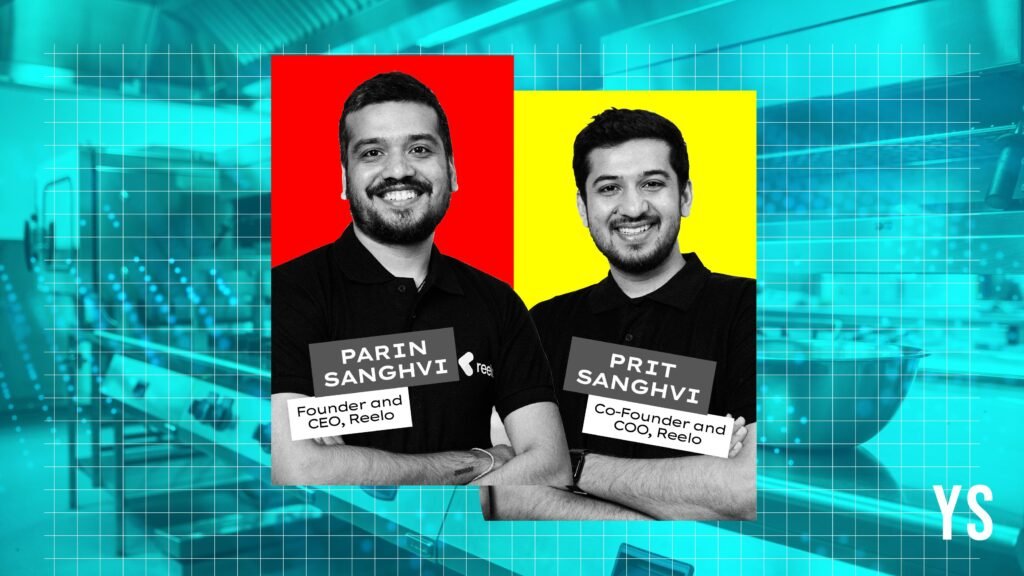
The math is brutal for Indian restaurants. Pay 20-30% commission to aggregators, compete on discounts that slash margins further, and still have no direct relationship with customers. After years of this cycle, many restaurant owners are asking: Is there a better way?
Parin Sanghvi thinks so. His Ahmedabad-based startup Reelo has become one of the platforms by flipping the script on restaurant marketing. Instead of chasing new customers through discounts, the startup looks to help restaurants turn first-time visitors into regulars through retention campaigns.
“The biggest challenge restaurants face today is that they don’t own their customer relationships,” Sanghvi says. “You’re essentially renting customers from aggregators. One discount becomes twenty. Suddenly, the margins have vanished.”
The aggregator trap
The pattern repeats across India’s food and beverage industry. Without direct customer connections, restaurants depend heavily on platform-driven visibility. They pay hefty commissions, compete primarily on price rather than brand, and watch their profit margins shrink with each promotional campaign.
This dependency has grown more problematic as regulatory scrutiny intensifies. India’s Competition Commission launched a comprehensive investigation in November 2024, uncovering systematic preferential treatment for large restaurant chains over independent establishments.
By January 2025, the CCI found both Zomato and Swiggy guilty of antitrust violations, specifically for enforcing price-parity clauses that prevented restaurants from offering competitive pricing on their own platforms.
For smaller restaurants, the power imbalance is stark. While major chains secure reduced commissions and enhanced platform visibility, independent establishments face the full brunt of aggregator fees with limited negotiating power.
Building direct relationships
Reelo’s approach centers on a core insight: customer retention, not just acquisition, drives sustainable growth in F&B. “Zomato or Swiggy might deliver the first order,” Sanghvi explains. “We help restaurants secure the hundredth visit.”
The platform integrates with over 35 point-of-sale systems, automatically capturing customer data during purchases without manual effort. This integration means restaurants don’t need extra apps or processes to gather insights. Once the data flows in, Reelo’s platform analyses customer behavior patterns and suggests targeted marketing actions.
Consider this scenario: It’s a rainy Thursday, foot traffic is down at a local brewery, and several regulars haven’t visited in six months. Reelo’s AI identifies this combination of factors and suggests sending those dormant customers a warm soup-and-bread combo offer. The system doesn’t just collect data, it turns it into actionable campaigns.
When a customer places a large first order but doesn’t return, the platform flags them as high-potential and suggests specific re-engagement strategies. This predictive approach helps restaurants intervene before customers drift away entirely.
This extends to feedback analysis as well. Restaurants receive thousands of monthly responses but lack time to process them effectively. Reelo automatically flags recurring issues such as dirty restrooms, poorly rated dishes, sluggish service, and routes them to the appropriate teams. “It’s like having a data analyst working around the clock,” Sanghvi notes.
Reelo’s most ambitious bet lies in restaurant memberships, a concept inspired from Amazon Prime and Panera’s US coffee subscriptions. These aren’t traditional loyalty programmes but prepaid plans loaded with specific perks: free drinks, priority seating, exclusive menu access.
Mumbai’s Nutcracker café offers an example. Their Rs 2,000 monthly pass includes 30 free coffees. The math works for both sides: customers commit upfront, brands earn upfront cash flow, and visits become habits rather than transactions.
“This isn’t just marketing,” Sanghvi emphasises. “It’s a completely new revenue stream.” In India’s discount-focused market, memberships offer restaurateurs an alternative to price competition. Instead of competing on cost, they build customer connections through perceived value.
The psychological element matters too. “When you pay for something, you feel invested,” Sanghvi explains. “That emotional ownership creates genuine brand loyalty.”
Reelo plans to launch this subscription tool to help restaurants turn customer loyalty into upfront, prepaid revenue. This addresses one of the industry’s biggest operational challenges: cash flow.
Boutique to scale
Sanghvi co-founded the company with his brother Prit in 2017, combining their experience from a family retail background to build a loyalty and engagement platform for small and mid‑sized businesses.
Launched as a boutique tool for restaurants, the startup has evolved into a 90-member team spanning Ahmedabad, Mumbai, and Pune. The company’s client roster includes major hospitality groups like Aditya Birla Hospitality (Hakkasan, Yuatcha), Lite Bite Foods (Punjab Grill), The Beer Cafe, Effingut Brewery, and Nando’s across thousands of outlets.
In 2023, Reelo secured a $1 million seed round led by Silicon Valley-based angel investor Gokul Rajaram. International expansion is already underway in the Middle East and Southeast Asia, with Sanghvi betting restaurant memberships will become globally standard.
Reelo’s model indirectly competes with players like Delhi based Xeno and Gurugram based EasyRewardz.
Challenges ahead
Despite early traction, Reelo faces significant hurdles. The Indian restaurant market remains fragmented, with many small establishments still operating on cash-heavy, low-tech models. Convincing these businesses to invest in retention technology requires demonstrating clear ROI, something that takes time to materialise.
Competition is intensifying too. As aggregators face regulatory pressure, they’re likely to launch their own retention tools to maintain restaurant relationships. Reelo will need to prove its technology remains superior to platform-native solutions.
The membership model, while promising, remains unproven at scale in India’s price-sensitive market. Consumer behavior around prepaid restaurant subscriptions may differ significantly from Western markets where such models have succeeded, said a restaurant owner in Bengaluru.
For Sanghvi, Reelo’s role extends beyond software features. “The aggregator model made restaurants passive,” he notes. “We’re helping them become more active—to understand their customers, engage directly, and build stronger brands.”
In FY25, the company is looking to hit an annual recurring revenue of $4 million.
His vision is ambitious: “Just like restaurants track dine-in and delivery revenue, we want memberships to become their third line item.”
As India’s restaurant sector faces increasing competition, tighter margins, and changing consumer behavior, platforms like Reelo are testing whether customer relationships, rather than discounting, can drive long-term success. The answer will determine not just Reelo’s future, but the evolution of India’s entire F&B ecosystem.

